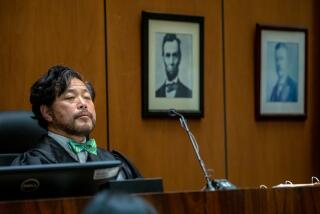North Loses Challenge to Secret Data Law
- Share via
WASHINGTON — The judge in the Iran-Contra case cleared the last major legal hurdle before setting a trial date for former White House aide Oliver L. North on Wednesday, ruling against North’s challenge to a procedure for using classified information in court.
U.S. District Judge Gerhard A. Gesell gave North until July 11 to provide a list of the government secrets he wants to use in his defense against charges that he was part of an illegal conspiracy that diverted profits from the Reagan Administration’s arms sales to Iran for the benefit of the Nicaraguan rebels.
Gesell’s ruling suggested that he will stick to his July 1 target for announcing a date for North’s trial--and that the trial could begin some time in September.
During Presidential Race
That calendar would put the start of the trial in the middle of the presidential election campaign. Gesell said in a hearing in April that he hoped to avoid conducting the trial during the campaign, “but he hasn’t said anything about it since then,” a source involved in the case noted.
Gesell provisionally rejected a defense challenge to the constitutionality of the Classified Information Procedures Act, which sets up a mechanism for deciding what government secrets must be revealed to ensure a fair trial when evidence may include classified data.
North, former National Security Adviser John M. Poindexter, retired Air Force Maj. Gen. Richard V. Secord and Iranian-American businessman Albert A. Hakim had argued that the act’s procedures for reviewing classified information would put them at a disadvantage in court because it would require them to reveal parts of their defense strategies.
They asked Gesell to declare the law unconstitutional.
‘Creative and Fair Solutions’
Instead, the judge cited directions from Congress to “fashion creative and fair solutions” when disputes arise over the use of classified information as evidence, and devised his own plan.
Under Gesell’s scheme, North must list the classified information he wants to use in his defense by July 11. The judge scheduled a closed hearing for July 14 to be attended only by North and his lawyers to hear why the documents on the list are relevant to the case.
The judge will then rule whether items on the list are relevant to the case and ask the Administration to declassify them for the trial, Gesell’s ruling said. Independent counsel Lawrence E. Walsh, the prosecutor in the case, would not be given the list of secrets, the ruling said.
At that point, however, another roadblock could arise: The Administration could refuse to declassify some secret information that appears important to North’s defense. That could create an impasse under which Gesell might have to dismiss the charges against North, sources said.
Uncertainty on Result
“The court is unable to determine definitely at this stage whether or not the classified document problems presented by this case can be resolved,” Gesell wrote.
Walsh already has submitted thousands of pages of documents as possible evidence in the case, including six boxes of unclassified or declassified papers and four boxes of documents that are still at least partly secret.
The enormous volume of secret documents stems from the fact that North, the former National Security Council aide who ran the Reagan Administration’s Iran arms sales plan and its effort to aid the Contras, worked on highly classified projects for his entire five-year tenure on the NSC staff.
The four defendants originally were named in a single conspiracy case but Gesell ordered the cases severed earlier this month. Walsh decided that North’s trial would be the first of the four.
Walsh’s office said: “We are pleased with Judge Gesell’s ruling on the constitutionality of the Classified Information Procedures Act as it applies to this case and we are prepared to move forward as directed by the court.”
A spokesman for North’s lawyer, Brendan V. Sullivan Jr., said he had no comment on the ruling.
Staff writer Ronald J. Ostrow contributed to this story.
More to Read
Get the L.A. Times Politics newsletter
Deeply reported insights into legislation, politics and policy from Sacramento, Washington and beyond. In your inbox twice per week.
You may occasionally receive promotional content from the Los Angeles Times.











